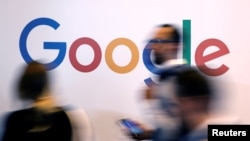U.S. politicians are the latest critics of a new cyber law in Vietnam, openly asking Google and Facebook to defy parts of the measure they say abets censorship at a time when Hanoi is putting a U.S. citizen on trial after attending a protest.
The two companies risk enabling a law that lets Vietnam delete web content, "access private data, spy on users, and further restrict the limited online speech freedoms enjoyed by Vietnamese citizens," according to two letters published Tuesday.
Seventeen members of the House of Representatives signed one version of the letter. The other was signed by Senators Marco Rubio, Bob Menendez, and Ron Wyden.
'Safe and healthy cyberspace'
The bipartisan group of legislators told Facebook and Google to avoid "storing user data within Vietnam if doing so means the data can be seized at any time by the Vietnamese government."
That would be in clear defiance of the cyber security law, which requires businesses to keep the data of Vietnamese users within the Southeast Asian country.
Vietnam's Foreign Ministry tells the Reuters news agency the new measure is designed to protect online rights and create "a safe and healthy cyberspace."
The U.S. politicians have a somewhat ironic solution to concerns Google and Facebook could be sending too much information to Hanoi: Send it to Washington, instead.
"Promptly and confidentially share with the relevant congressional committees all requests for user data from the Vietnamese authorities and indicate which ones we've complied with," said the letter, addressed to Google and Facebook, the day representatives from the two companies testified to Congress about their general filtering practices.
U.S. citizen held in Vietnam
The missive said the social media companies could be cooperating with a Vietnamese government that is "backsliding" on human rights, holding more than 100 prisoners of conscience.
One of those imprisoned soon could be U.S. citizen William Nguyen, who was detained after joining a protest in Ho Chi Minh City. Some hoped U.S. Secretary of State Mike Pompeo would secure his release upon visiting Hanoi this month, but that did not happen. Nguyen was later seen expressing regret on state TV.
"Human Rights Watch is very concerned that Nguyen's public statement violated his due process rights and may have been coerced," said Phil Robertson, the group's deputy Asia director.
Web sites popular in Vietnam
Google, which owns YouTube, and Facebook dominate the digital ad market worldwide and are very popular in Vietnam.
Congressman Chris Smith (R-NJ) suggested they could leverage that popularity.
"Companies like Google and Facebook have tremendous market appeal in Vietnam. They have both an opportunity and a moral obligation to promote free expression and other human rights in Vietnam and to push back against the limitation of those freedoms by the new cyber security law," he said. "Such a stand would help burnish the tarnished reputations of tech companies globally."
Issues that have affected the reputations of both internet companies have varied, from the use of Facebook data to influence political elections, to the pairing of YouTube ads with offensive videos that caused a boycott among some advertisers.
Local laws influence decision
In the House hearing on Tuesday, Facebook was asked if it is censoring free speech by deleting posts when asked to do so by authorities like Vietnam's government.
"Our legal team will look at the requesting authority, the process itself, who was affected by the speech, any human rights implications, and then we will make a decision about whether or not we should restrict content in accordance with that local law," Monika Bickert, the company's vice president of global policy management, said in her testimony.
Bickert, who met with Vietnam's information ministry in 2017, added, "We do not store data in Vietnam."
The new law takes effect Jan. 1, 2019.





